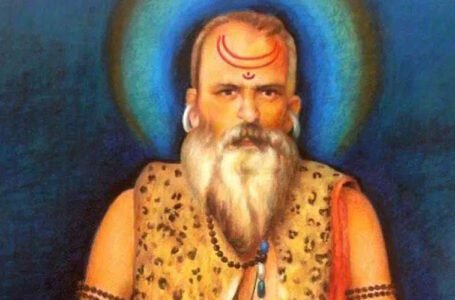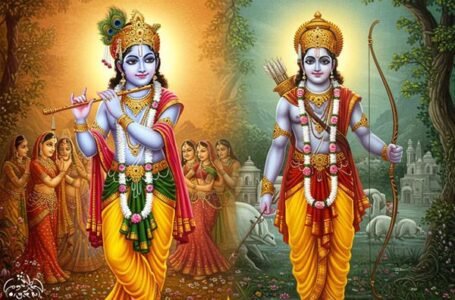Ved Vyas: The Architect of Indian Mythology
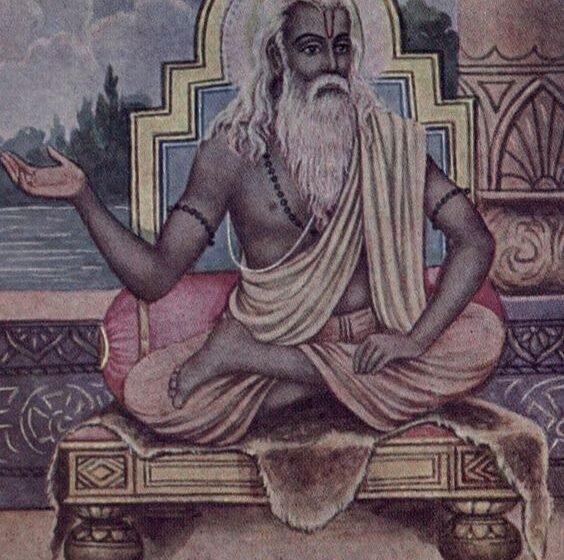
Vyasa, also known as Vedavyasa, is a revered sage in Hindu tradition, celebrated for his profound contributions to ancient Indian literature and philosophy. Born as Krishna Dvaipayana, he is hailed as the compiler of the Vedas, the ancient scriptures of Hinduism, into their four distinct parts: Rigveda, Samaveda, Yajurveda, and Atharvaveda. His magnum opus, the Mahabharata, stands as one of the longest epic poems ever written, chronicling the great Kurukshetra War and encompassing a vast array of moral, philosophical, and theological teachings.
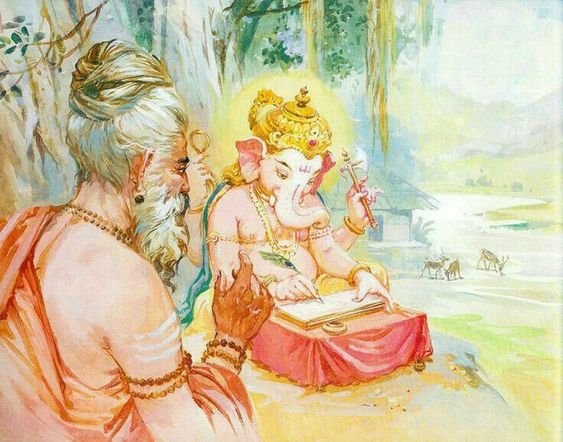
As the son of the sage Parashara and the fisherwoman Satyavati, Vyasa’s birth itself is shrouded in myth and legend, symbolizing the union of divine wisdom and earthly existence. Throughout his life, he played a pivotal role in shaping the spiritual and intellectual landscape of ancient India, serving as a guru to illustrious disciples like Shuka, Jaimini, and Vaishampayana.
Vyasa’s legacy extends beyond literature; he is also credited with composing the eighteen Puranas, which serve as repositories of myth, legend, and religious instruction. Additionally, he is revered as the author of the Brahma Sutras, foundational texts of Vedanta philosophy, elucidating the nature of reality and the pursuit of spiritual liberation.
Regarded as a partial incarnation of the god Vishnu, Vyasa is venerated as a timeless sage, transcending the boundaries of mortal existence and embodying the eternal wisdom of the ages. His influence resonates across generations, inspiring seekers of truth and wisdom to delve deeper into the mysteries of existence.
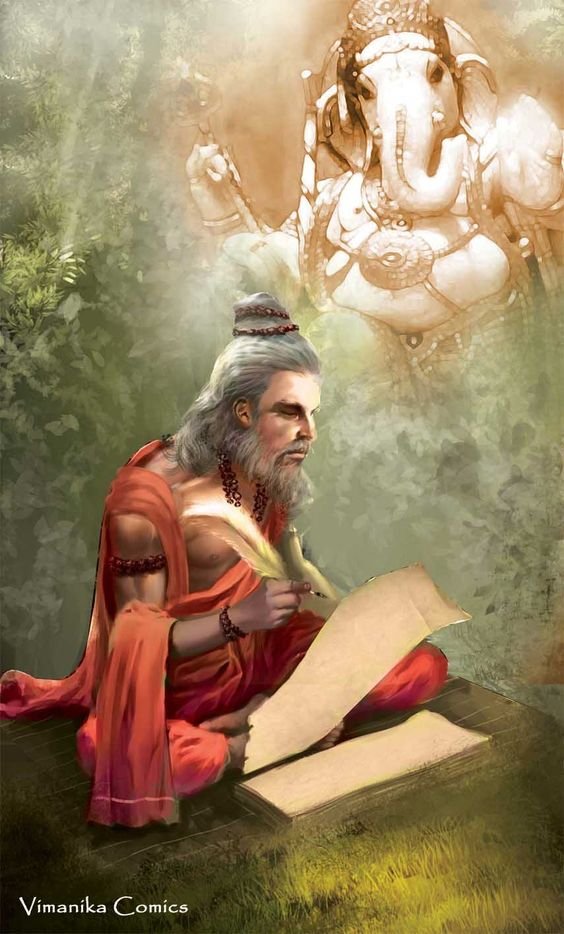
Birth and Background
Vyasa, originally known as Krishna Dvaipayana, stands as an eminent figure in Hindu tradition, renowned for his monumental contribution to the preservation and dissemination of ancient Vedic wisdom. While his birth name hints at his dark complexion and birthplace, he is more commonly revered as “Veda Vyasa” for his pivotal role in compiling the single, eternal Veda into four distinct books: Rigveda, Samaveda, Yajurveda, and Atharvaveda. The term “Vyasa” itself carries profound significance, denoting a compiler, arranger, or separator, reflecting Vyasa’s crucial task of organizing and disseminating the sacred scriptures.
Swami Vivekananda’s perspective offers a nuanced understanding of Vyasa’s identity, suggesting that Vyasa may not have been a single individual but rather a lineage of sages who contributed to the development of Vedic knowledge. This interpretation implies that the title “Vyasa” transcends individual attribution, symbolizing a collective endeavor towards spiritual enlightenment and intellectual advancement. In this context, anyone who contributed to the creation of new Puranas or scriptures could be recognized as a Vyasa, embodying the spirit of divine inspiration and wisdom.
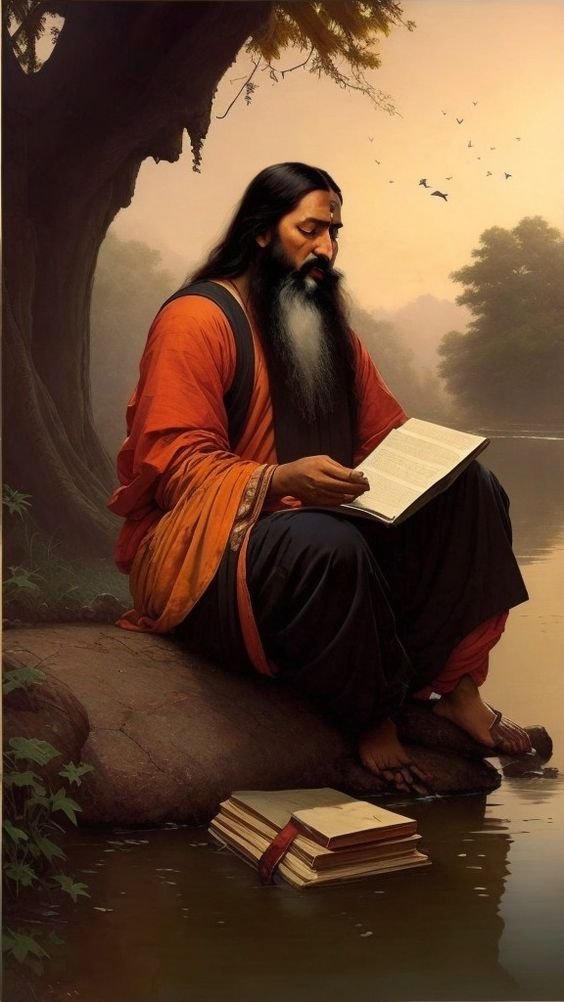
According to Hindu tradition, Vyasa’s role as the “Splitter of the Vedas” is revered for its profound significance in facilitating the comprehension and dissemination of divine knowledge. By subcategorizing the primordial Veda into its four parts, Vyasa enabled humanity to access the transcendental wisdom encapsulated within the scriptures, thereby fostering spiritual growth and enlightenment among seekers.
The Vishnu Purana provides further insight into Vyasa’s significance within the cosmic order of Hindu cosmology. The cyclic nature of the universe, characterized by the sequential manifestation and dissolution of creation, is governed by a series of Manus who preside over distinct periods known as manvantaras. Each manvantara comprises multiple Yuga Cycles, each consisting of four yuga ages marked by declining moral and spiritual virtues.
Vyasa’s pivotal role in Hindu chronology underscores his connection to the cosmic cycles of creation and dissolution. As a divine sage embodying the timeless wisdom of the ages, Vyasa serves as a beacon of enlightenment, guiding humanity through the ebb and flow of cosmic evolution. His legacy continues to inspire generations of seekers, offering profound insights into the nature of existence and the pursuit of spiritual truth.
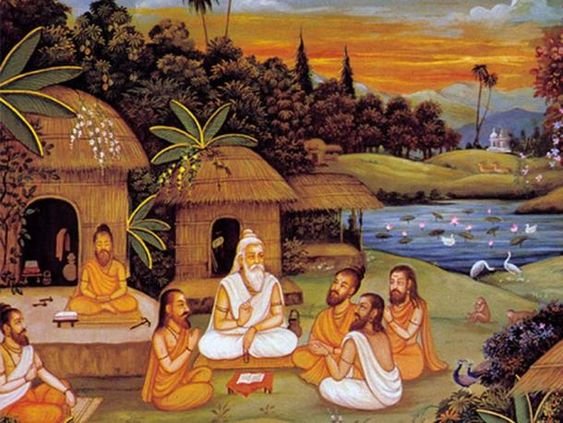
In essence, Vyasa’s contributions transcend mere authorship; they embody the essence of spiritual enlightenment and intellectual advancement, serving as a testament to the enduring legacy of ancient Vedic wisdom. Through his timeless teachings and profound insights, Vyasa remains a guiding light for humanity’s journey towards spiritual realization and self-discovery.
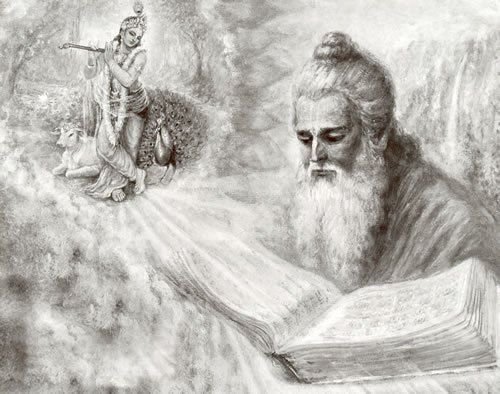
The Mahabharata: Navigating life’s Battles
Vyasa’s pivotal role in the Mahabharata extends beyond mere authorship; he is also an integral character within the epic narrative. While the traditional belief attributes the writing of the Mahabharata to Vyasa, scholars view the story of Ganesha transcribing the text at Vyasa’s dictation as a later addition to the epic, omitted in the Critical Edition. However, Vyasa’s influence on the epic transcends mere storytelling; he is intricately woven into the fabric of the Mahabharata’s narrative as both chronicler and participant.
As the patriarch of the Kuru lineage, Vyasa’s relationship with the protagonists and antagonists of the epic is complex and multifaceted. He is not only the biological father of the Pandava and Kaurava princes but also plays a crucial role in their upbringing and destiny. Through the practice of Niyoga, Vyasa fathers the Pandavas on behalf of his deceased elder brother, ensuring the continuation of the Kuru dynasty. Additionally, he is responsible for the incubation of the hundred Kaurava brothers, further entwining his fate with that of his descendants.
Vyasa’s authorship of the Mahabharata is thus deeply personal, serving as a biography of his own family and their struggles for power and righteousness. The core of the epic, known as Jaya, depicts a dialogue between Dhritarashtra and his charioteer Sanjaya, providing a chronological account of the Kurukshetra War. Dhritarashtra’s inquiries and lamentations reflect the moral complexity and profound consequences of the conflict, echoing the timeless themes of duty, righteousness, and the inevitability of destiny.
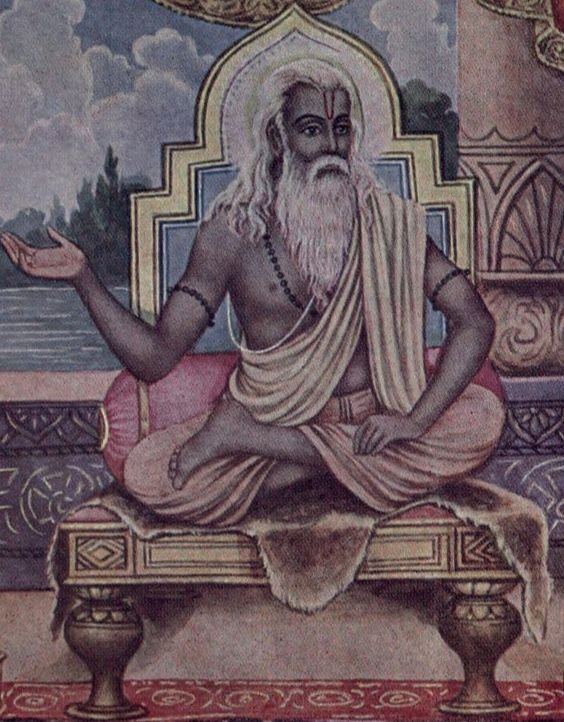
The Bhagavad Gita, nestled within the Bhishma Parva of the Mahabharata, stands as a profound philosophico-religious dialogue, counseling Pandava Prince Arjuna amidst the turmoil of the Kurukshetra War. Dated to the second half of the first millennium BCE, it has garnered global acclaim for its timeless wisdom, inspiring numerous commentaries and translations across cultures and generations. As a dialogue between Arjuna and his charioteer, revealed to be the divine avatar Krishna, the Gita offers profound insights into duty, morality, and the nature of existence.
The Mahabharata itself, spanning 100,000 verses, serves as an encyclopedic repository of ancient Indian lore, containing detailed descriptions of kingdoms, tribes, military formations, and the epic’s central conflict. Vyasa’s Jaya, within which the Bhagavad Gita is embedded, covers diverse subjects ranging from geography and history to warfare and morality, reflecting the multifaceted nature of human existence.
Structured as a narration by Ugrasrava Sauti to an assembly of rishis, the Mahabharata unfolds within the framework of a storytelling tradition, conveying its epic tale to eager listeners. With its sprawling narrative and rich characterizations, it remains unparalleled in its scope and depth, capturing the essence of Indian mythology and culture.
Through its enduring legacy, the Mahabharata continues to captivate audiences worldwide, offering profound insights into the complexities of human nature and the timeless struggle between dharma and adharma.
Other works attributed to Vyasa
Vyasa’s profound influence extends across a diverse spectrum of Hindu scriptures and traditions, encapsulating his stature as a sage of unparalleled wisdom and spiritual insight. Credited with the writing of the eighteen major Purāṇas, Vyasa’s contributions to Indian literature are vast and varied, covering an extensive range of topics that encompass various scriptures and mythological narratives.
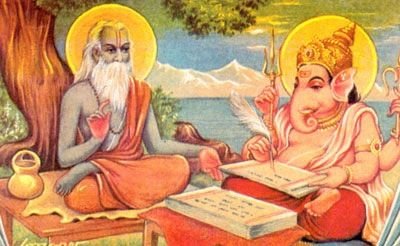
Furthermore, Vyasa is revered as the author of the Brahma Sutras, also known as the Vedanta Sutras, which serve as foundational texts of Vedanta philosophy. Under the epithet Badarayana, Vyasa expounds upon the intricate teachings of Vedanta, elucidating the metaphysical principles that underpin Hindu thought and spirituality. His appellation as Vyasa, meaning “one who arranges,” underscores his role as a divine orchestrator of sacred knowledge.
Legends and Myths associated with Vyasa
In addition to his literary endeavors, Vyasa’s personal life and lineage are intertwined with myth and legend. His son, Shuka, serves as his spiritual successor and heir, embodying the continuity of Vyasa’s spiritual lineage. Shuka’s role as a spiritual guide to the young Kuru princes underscores the transmission of wisdom from one generation to the next.
Vyasa’s disciples, including Paila, Jaimini, Vaishampayana, and Sumantu, are entrusted with the dissemination of Vedic knowledge, reflecting Vyasa’s commitment to preserving and propagating the ancient scriptures. Each disciple is tasked with spreading the teachings of one of the four Vedas, ensuring the continuity of Vedic tradition.
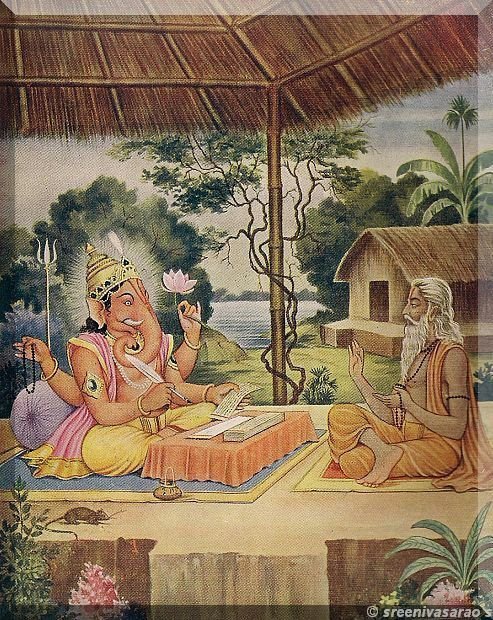
Traditionally believed to have resided on the banks of the Ganga in modern-day Uttarakhand, Vyasa’s presence in this sacred locale imbues it with spiritual significance. His interactions with Adi Shankara, as recounted in the Sankara Digvijaya, underscore his status as a revered sage and spiritual guide, guiding Shankara in his scholarly pursuits and philosophical inquiries.
Furthermore, Vyasa is venerated in Sikhism, with Guru Gobind Singh hailing him as an avatar of Brahma in the Brahm Avtar. In Sikh tradition, Vyasa is considered the fifth incarnation of Brahma and is credited with composing hymns and verses that extol the virtues of great kings and impart Vedic knowledge.
The festival of Guru Purnima, also known as Vyasa Purnima, is dedicated to honoring Vyasa’s birth and his pivotal role in dividing the Vedas, symbolizing his enduring legacy as a beacon of wisdom and enlightenment in Hindu tradition. Through his timeless teachings and profound insights, Vyasa continues to inspire seekers of truth and spiritual wisdom across generations and cultural boundaries.
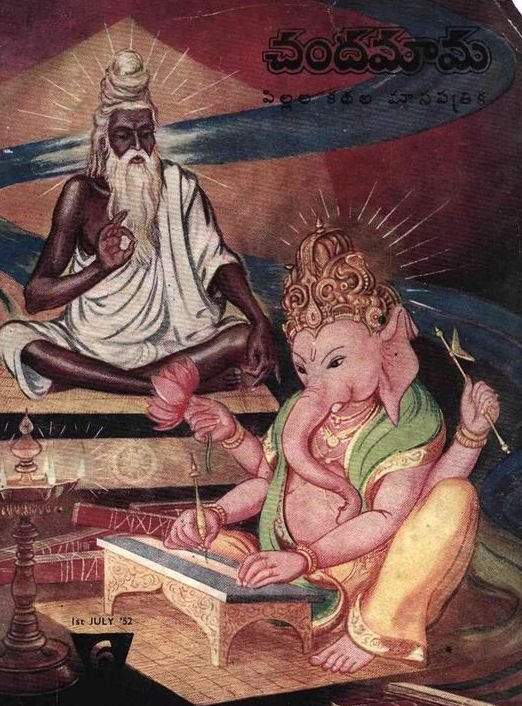
Conclusion
The Mahabharata stands as a cornerstone of Indian culture, embodying timeless wisdom, moral dilemmas, and profound philosophical insights that continue to resonate with people across generations. Its sprawling narrative delves into the complexities of human nature, duty, and the eternal struggle between righteousness and adharma. As the compiler of this epic, Vyasa’s legacy remains indelibly imprinted on Indian culture, serving as a guiding light for spiritual seekers and moral philosophers alike.
Vyasa’s enduring presence is felt not only through his monumental literary contributions but also in the rituals, festivals, and traditions that honor his memory. The festival of Guru Purnima, dedicated to Vyasa, reflects the reverence and gratitude of devotees for his invaluable teachings and guidance. Moreover, Vyasa’s influence extends beyond Hinduism, as evidenced by his mention in Sikh scripture and the profound impact of his work on global literature and philosophy.
In essence, Vyasa’s spirit lives on through the timeless wisdom encapsulated in the Mahabharata, inspiring individuals to seek truth, righteousness, and spiritual enlightenment. As a symbol of cultural heritage and spiritual enlightenment, Vyasa and the Mahabharata continue to exert a profound influence on Indian culture and society, serving as beacons of wisdom and moral guidance for generations to come.
